Reflective Report: Healthcare Placement at King's College Hospital
VerifiedAdded on 2023/01/18
|13
|4094
|25
Report
AI Summary
This report details a healthcare placement at King's College Hospital, focusing on tasks 2 and 3. It begins with an introduction emphasizing the importance of practical experience in healthcare. Task 2 includes a reflective placement journal documenting the student's experiences as a support worker, highlighting knowledge gained and personal reflections. The Gibbs Reflective Cycle is applied to a specific scenario involving an elderly patient, analyzing feelings, evaluation, and action plans. Task 3 provides a brief description of the organization, evaluating its activities, structure, opportunities, mission, and working practices. It analyzes the roles of stakeholders like support workers, the government, suppliers, and employees, along with the importance of data protection. A critical evaluation of the placement organization and its activities is included, focusing on the support worker's role and the organization's strengths and weaknesses. The report aims to provide a comprehensive overview of the student's practical experience and reflective learning within a healthcare setting.
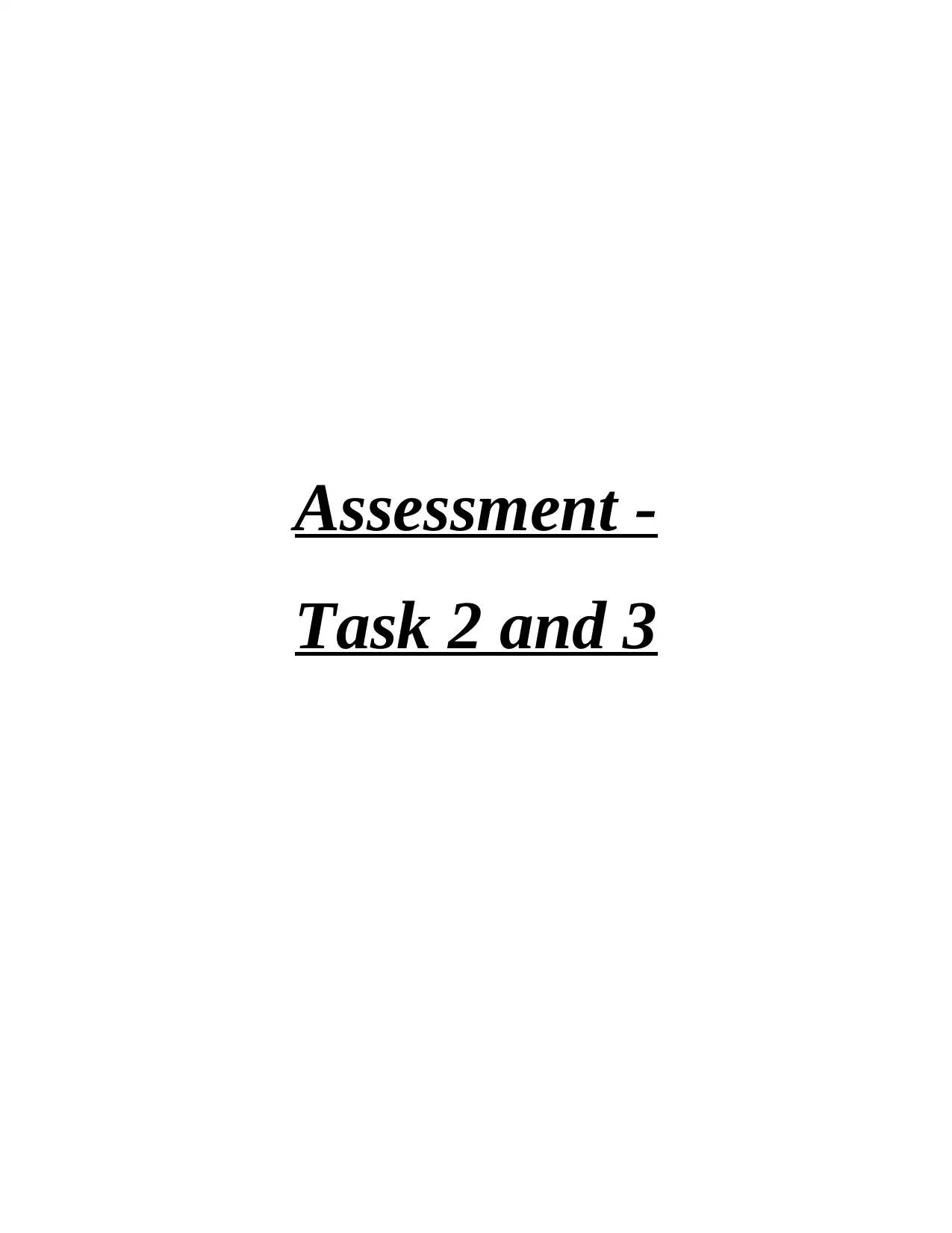
Assessment -
Task 2 and 3
Task 2 and 3
Paraphrase This Document
Need a fresh take? Get an instant paraphrase of this document with our AI Paraphraser
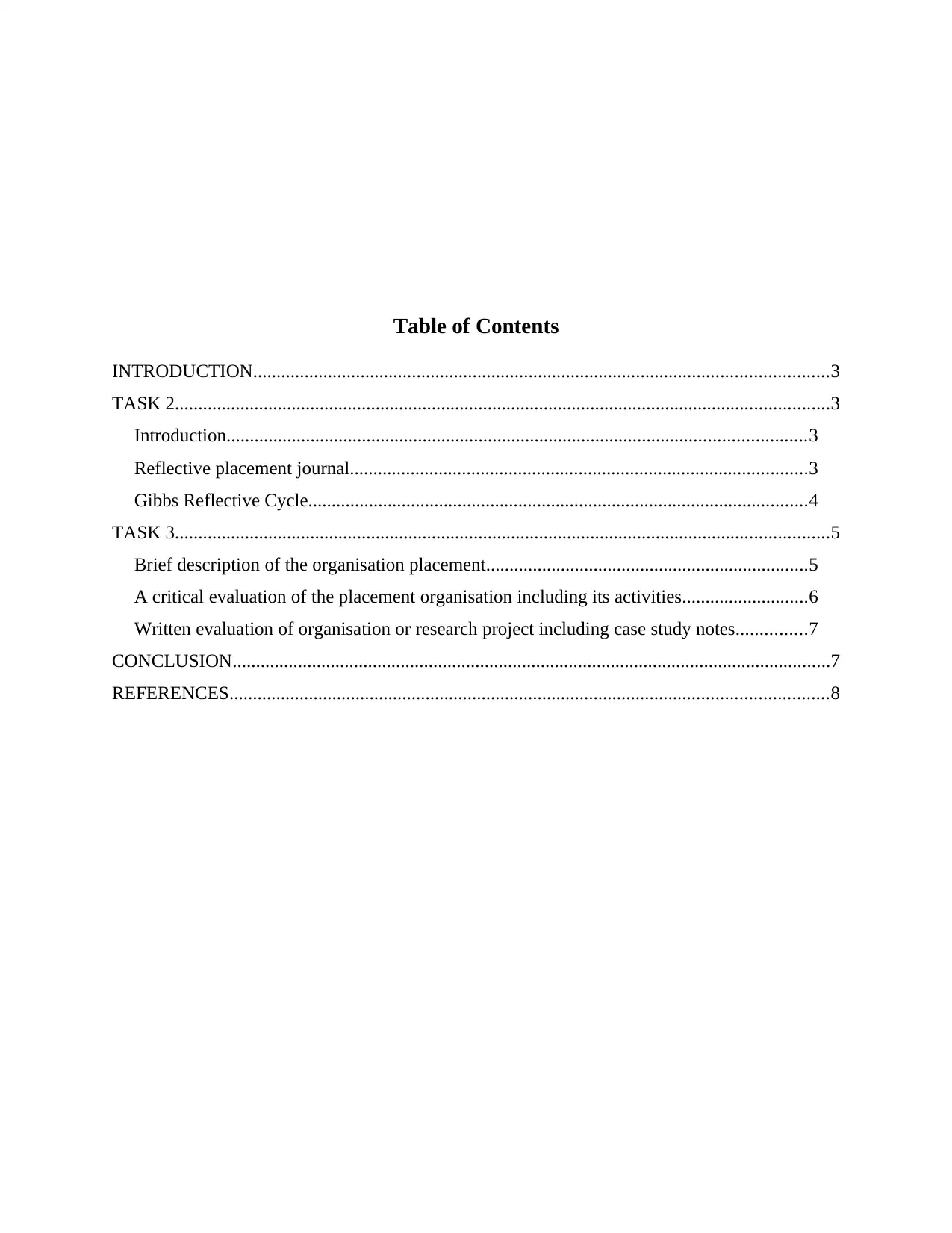
Table of Contents
INTRODUCTION...........................................................................................................................3
TASK 2............................................................................................................................................3
Introduction............................................................................................................................3
Reflective placement journal..................................................................................................3
Gibbs Reflective Cycle...........................................................................................................4
TASK 3............................................................................................................................................5
Brief description of the organisation placement.....................................................................5
A critical evaluation of the placement organisation including its activities...........................6
Written evaluation of organisation or research project including case study notes...............7
CONCLUSION................................................................................................................................7
REFERENCES................................................................................................................................8
INTRODUCTION...........................................................................................................................3
TASK 2............................................................................................................................................3
Introduction............................................................................................................................3
Reflective placement journal..................................................................................................3
Gibbs Reflective Cycle...........................................................................................................4
TASK 3............................................................................................................................................5
Brief description of the organisation placement.....................................................................5
A critical evaluation of the placement organisation including its activities...........................6
Written evaluation of organisation or research project including case study notes...............7
CONCLUSION................................................................................................................................7
REFERENCES................................................................................................................................8
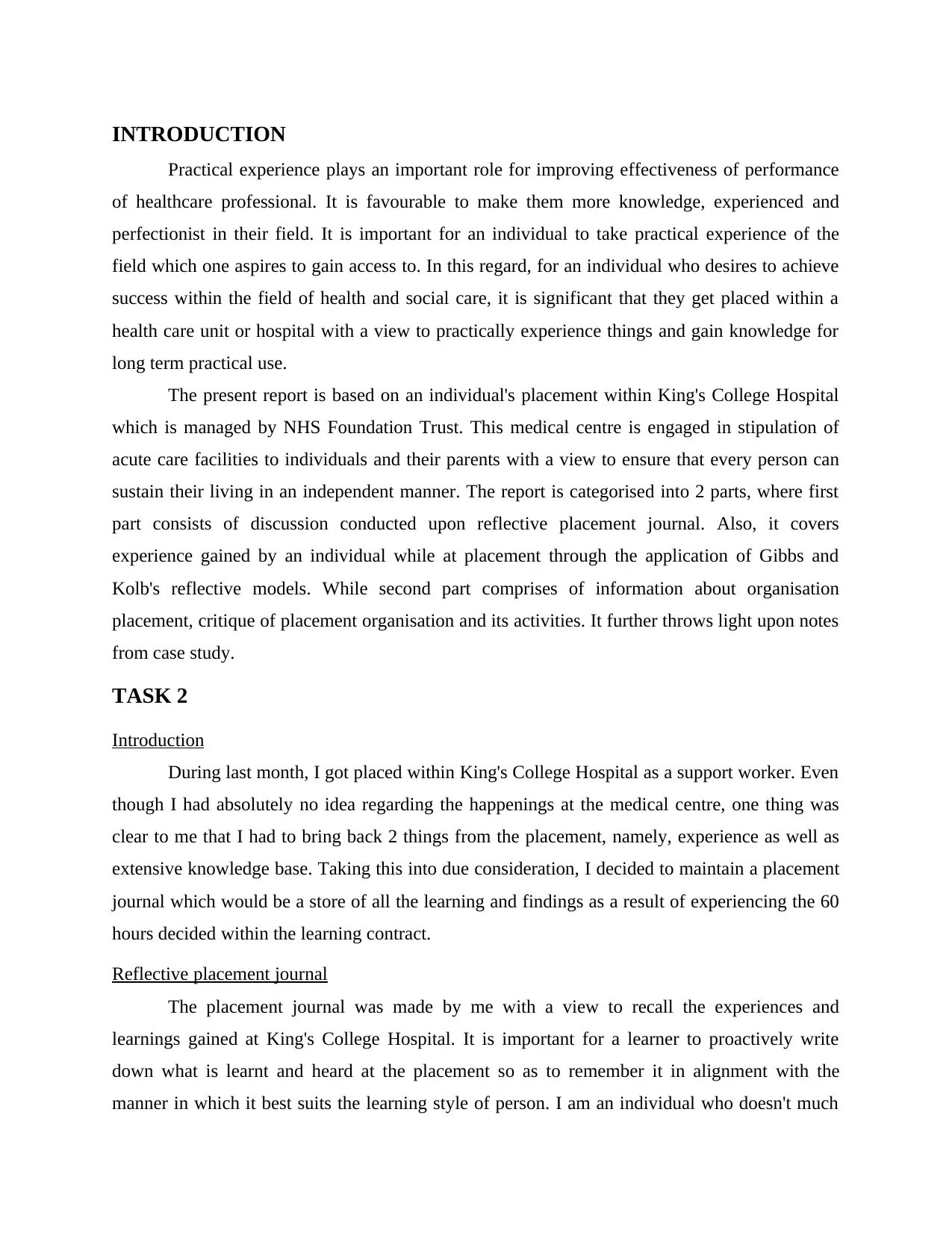
INTRODUCTION
Practical experience plays an important role for improving effectiveness of performance
of healthcare professional. It is favourable to make them more knowledge, experienced and
perfectionist in their field. It is important for an individual to take practical experience of the
field which one aspires to gain access to. In this regard, for an individual who desires to achieve
success within the field of health and social care, it is significant that they get placed within a
health care unit or hospital with a view to practically experience things and gain knowledge for
long term practical use.
The present report is based on an individual's placement within King's College Hospital
which is managed by NHS Foundation Trust. This medical centre is engaged in stipulation of
acute care facilities to individuals and their parents with a view to ensure that every person can
sustain their living in an independent manner. The report is categorised into 2 parts, where first
part consists of discussion conducted upon reflective placement journal. Also, it covers
experience gained by an individual while at placement through the application of Gibbs and
Kolb's reflective models. While second part comprises of information about organisation
placement, critique of placement organisation and its activities. It further throws light upon notes
from case study.
TASK 2
Introduction
During last month, I got placed within King's College Hospital as a support worker. Even
though I had absolutely no idea regarding the happenings at the medical centre, one thing was
clear to me that I had to bring back 2 things from the placement, namely, experience as well as
extensive knowledge base. Taking this into due consideration, I decided to maintain a placement
journal which would be a store of all the learning and findings as a result of experiencing the 60
hours decided within the learning contract.
Reflective placement journal
The placement journal was made by me with a view to recall the experiences and
learnings gained at King's College Hospital. It is important for a learner to proactively write
down what is learnt and heard at the placement so as to remember it in alignment with the
manner in which it best suits the learning style of person. I am an individual who doesn't much
Practical experience plays an important role for improving effectiveness of performance
of healthcare professional. It is favourable to make them more knowledge, experienced and
perfectionist in their field. It is important for an individual to take practical experience of the
field which one aspires to gain access to. In this regard, for an individual who desires to achieve
success within the field of health and social care, it is significant that they get placed within a
health care unit or hospital with a view to practically experience things and gain knowledge for
long term practical use.
The present report is based on an individual's placement within King's College Hospital
which is managed by NHS Foundation Trust. This medical centre is engaged in stipulation of
acute care facilities to individuals and their parents with a view to ensure that every person can
sustain their living in an independent manner. The report is categorised into 2 parts, where first
part consists of discussion conducted upon reflective placement journal. Also, it covers
experience gained by an individual while at placement through the application of Gibbs and
Kolb's reflective models. While second part comprises of information about organisation
placement, critique of placement organisation and its activities. It further throws light upon notes
from case study.
TASK 2
Introduction
During last month, I got placed within King's College Hospital as a support worker. Even
though I had absolutely no idea regarding the happenings at the medical centre, one thing was
clear to me that I had to bring back 2 things from the placement, namely, experience as well as
extensive knowledge base. Taking this into due consideration, I decided to maintain a placement
journal which would be a store of all the learning and findings as a result of experiencing the 60
hours decided within the learning contract.
Reflective placement journal
The placement journal was made by me with a view to recall the experiences and
learnings gained at King's College Hospital. It is important for a learner to proactively write
down what is learnt and heard at the placement so as to remember it in alignment with the
manner in which it best suits the learning style of person. I am an individual who doesn't much
⊘ This is a preview!⊘
Do you want full access?
Subscribe today to unlock all pages.

Trusted by 1+ million students worldwide
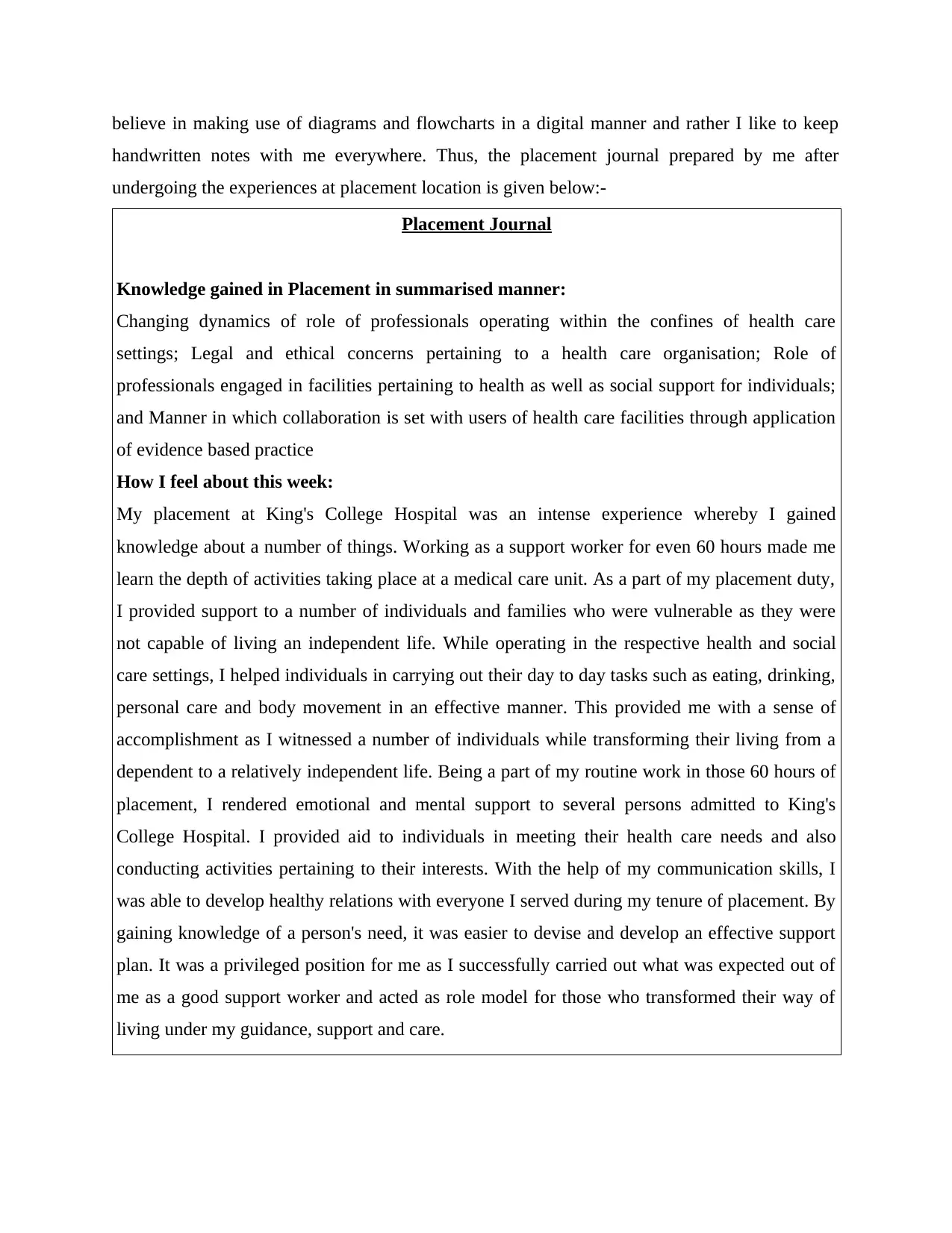
believe in making use of diagrams and flowcharts in a digital manner and rather I like to keep
handwritten notes with me everywhere. Thus, the placement journal prepared by me after
undergoing the experiences at placement location is given below:-
Placement Journal
Knowledge gained in Placement in summarised manner:
Changing dynamics of role of professionals operating within the confines of health care
settings; Legal and ethical concerns pertaining to a health care organisation; Role of
professionals engaged in facilities pertaining to health as well as social support for individuals;
and Manner in which collaboration is set with users of health care facilities through application
of evidence based practice
How I feel about this week:
My placement at King's College Hospital was an intense experience whereby I gained
knowledge about a number of things. Working as a support worker for even 60 hours made me
learn the depth of activities taking place at a medical care unit. As a part of my placement duty,
I provided support to a number of individuals and families who were vulnerable as they were
not capable of living an independent life. While operating in the respective health and social
care settings, I helped individuals in carrying out their day to day tasks such as eating, drinking,
personal care and body movement in an effective manner. This provided me with a sense of
accomplishment as I witnessed a number of individuals while transforming their living from a
dependent to a relatively independent life. Being a part of my routine work in those 60 hours of
placement, I rendered emotional and mental support to several persons admitted to King's
College Hospital. I provided aid to individuals in meeting their health care needs and also
conducting activities pertaining to their interests. With the help of my communication skills, I
was able to develop healthy relations with everyone I served during my tenure of placement. By
gaining knowledge of a person's need, it was easier to devise and develop an effective support
plan. It was a privileged position for me as I successfully carried out what was expected out of
me as a good support worker and acted as role model for those who transformed their way of
living under my guidance, support and care.
handwritten notes with me everywhere. Thus, the placement journal prepared by me after
undergoing the experiences at placement location is given below:-
Placement Journal
Knowledge gained in Placement in summarised manner:
Changing dynamics of role of professionals operating within the confines of health care
settings; Legal and ethical concerns pertaining to a health care organisation; Role of
professionals engaged in facilities pertaining to health as well as social support for individuals;
and Manner in which collaboration is set with users of health care facilities through application
of evidence based practice
How I feel about this week:
My placement at King's College Hospital was an intense experience whereby I gained
knowledge about a number of things. Working as a support worker for even 60 hours made me
learn the depth of activities taking place at a medical care unit. As a part of my placement duty,
I provided support to a number of individuals and families who were vulnerable as they were
not capable of living an independent life. While operating in the respective health and social
care settings, I helped individuals in carrying out their day to day tasks such as eating, drinking,
personal care and body movement in an effective manner. This provided me with a sense of
accomplishment as I witnessed a number of individuals while transforming their living from a
dependent to a relatively independent life. Being a part of my routine work in those 60 hours of
placement, I rendered emotional and mental support to several persons admitted to King's
College Hospital. I provided aid to individuals in meeting their health care needs and also
conducting activities pertaining to their interests. With the help of my communication skills, I
was able to develop healthy relations with everyone I served during my tenure of placement. By
gaining knowledge of a person's need, it was easier to devise and develop an effective support
plan. It was a privileged position for me as I successfully carried out what was expected out of
me as a good support worker and acted as role model for those who transformed their way of
living under my guidance, support and care.
Paraphrase This Document
Need a fresh take? Get an instant paraphrase of this document with our AI Paraphraser
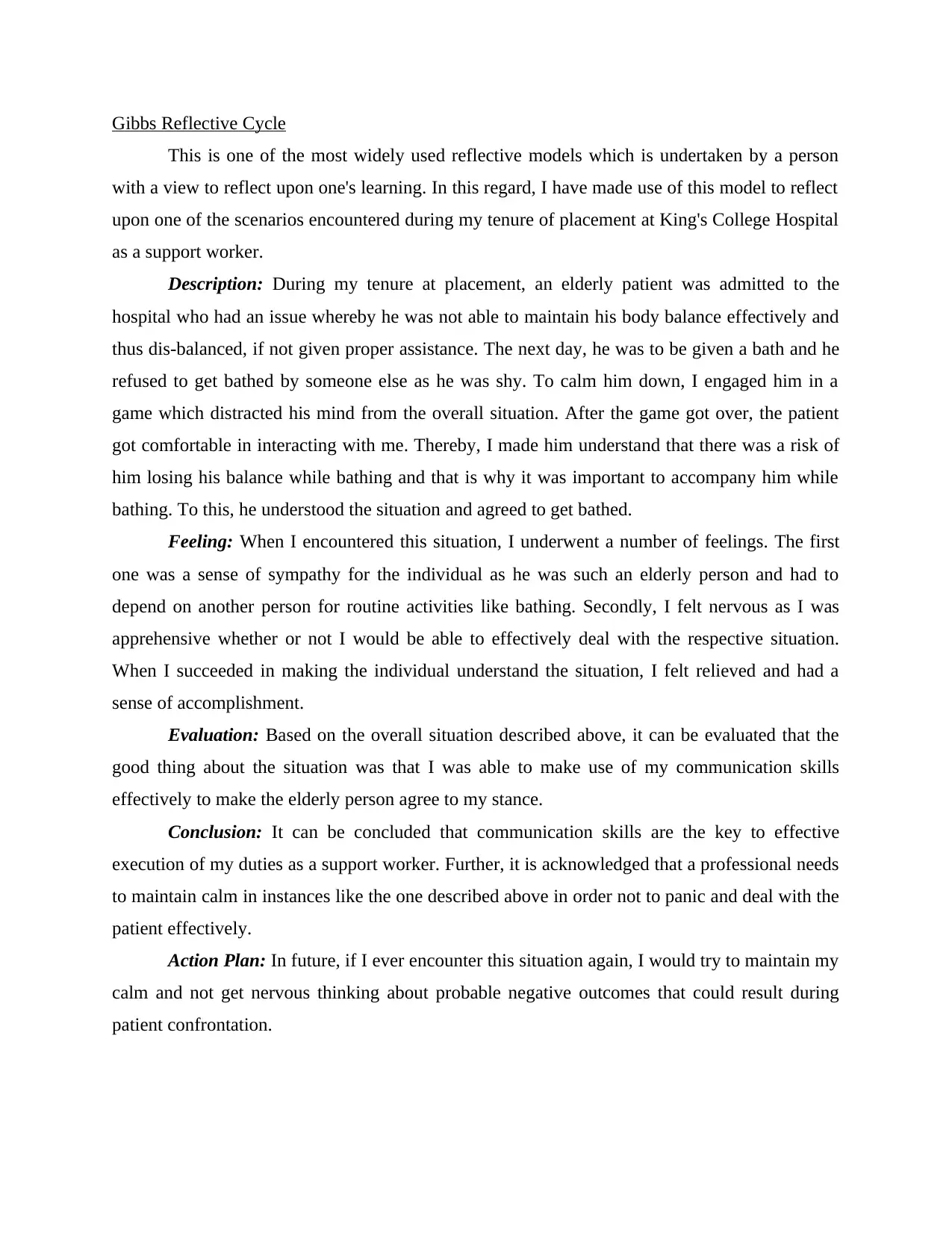
Gibbs Reflective Cycle
This is one of the most widely used reflective models which is undertaken by a person
with a view to reflect upon one's learning. In this regard, I have made use of this model to reflect
upon one of the scenarios encountered during my tenure of placement at King's College Hospital
as a support worker.
Description: During my tenure at placement, an elderly patient was admitted to the
hospital who had an issue whereby he was not able to maintain his body balance effectively and
thus dis-balanced, if not given proper assistance. The next day, he was to be given a bath and he
refused to get bathed by someone else as he was shy. To calm him down, I engaged him in a
game which distracted his mind from the overall situation. After the game got over, the patient
got comfortable in interacting with me. Thereby, I made him understand that there was a risk of
him losing his balance while bathing and that is why it was important to accompany him while
bathing. To this, he understood the situation and agreed to get bathed.
Feeling: When I encountered this situation, I underwent a number of feelings. The first
one was a sense of sympathy for the individual as he was such an elderly person and had to
depend on another person for routine activities like bathing. Secondly, I felt nervous as I was
apprehensive whether or not I would be able to effectively deal with the respective situation.
When I succeeded in making the individual understand the situation, I felt relieved and had a
sense of accomplishment.
Evaluation: Based on the overall situation described above, it can be evaluated that the
good thing about the situation was that I was able to make use of my communication skills
effectively to make the elderly person agree to my stance.
Conclusion: It can be concluded that communication skills are the key to effective
execution of my duties as a support worker. Further, it is acknowledged that a professional needs
to maintain calm in instances like the one described above in order not to panic and deal with the
patient effectively.
Action Plan: In future, if I ever encounter this situation again, I would try to maintain my
calm and not get nervous thinking about probable negative outcomes that could result during
patient confrontation.
This is one of the most widely used reflective models which is undertaken by a person
with a view to reflect upon one's learning. In this regard, I have made use of this model to reflect
upon one of the scenarios encountered during my tenure of placement at King's College Hospital
as a support worker.
Description: During my tenure at placement, an elderly patient was admitted to the
hospital who had an issue whereby he was not able to maintain his body balance effectively and
thus dis-balanced, if not given proper assistance. The next day, he was to be given a bath and he
refused to get bathed by someone else as he was shy. To calm him down, I engaged him in a
game which distracted his mind from the overall situation. After the game got over, the patient
got comfortable in interacting with me. Thereby, I made him understand that there was a risk of
him losing his balance while bathing and that is why it was important to accompany him while
bathing. To this, he understood the situation and agreed to get bathed.
Feeling: When I encountered this situation, I underwent a number of feelings. The first
one was a sense of sympathy for the individual as he was such an elderly person and had to
depend on another person for routine activities like bathing. Secondly, I felt nervous as I was
apprehensive whether or not I would be able to effectively deal with the respective situation.
When I succeeded in making the individual understand the situation, I felt relieved and had a
sense of accomplishment.
Evaluation: Based on the overall situation described above, it can be evaluated that the
good thing about the situation was that I was able to make use of my communication skills
effectively to make the elderly person agree to my stance.
Conclusion: It can be concluded that communication skills are the key to effective
execution of my duties as a support worker. Further, it is acknowledged that a professional needs
to maintain calm in instances like the one described above in order not to panic and deal with the
patient effectively.
Action Plan: In future, if I ever encounter this situation again, I would try to maintain my
calm and not get nervous thinking about probable negative outcomes that could result during
patient confrontation.
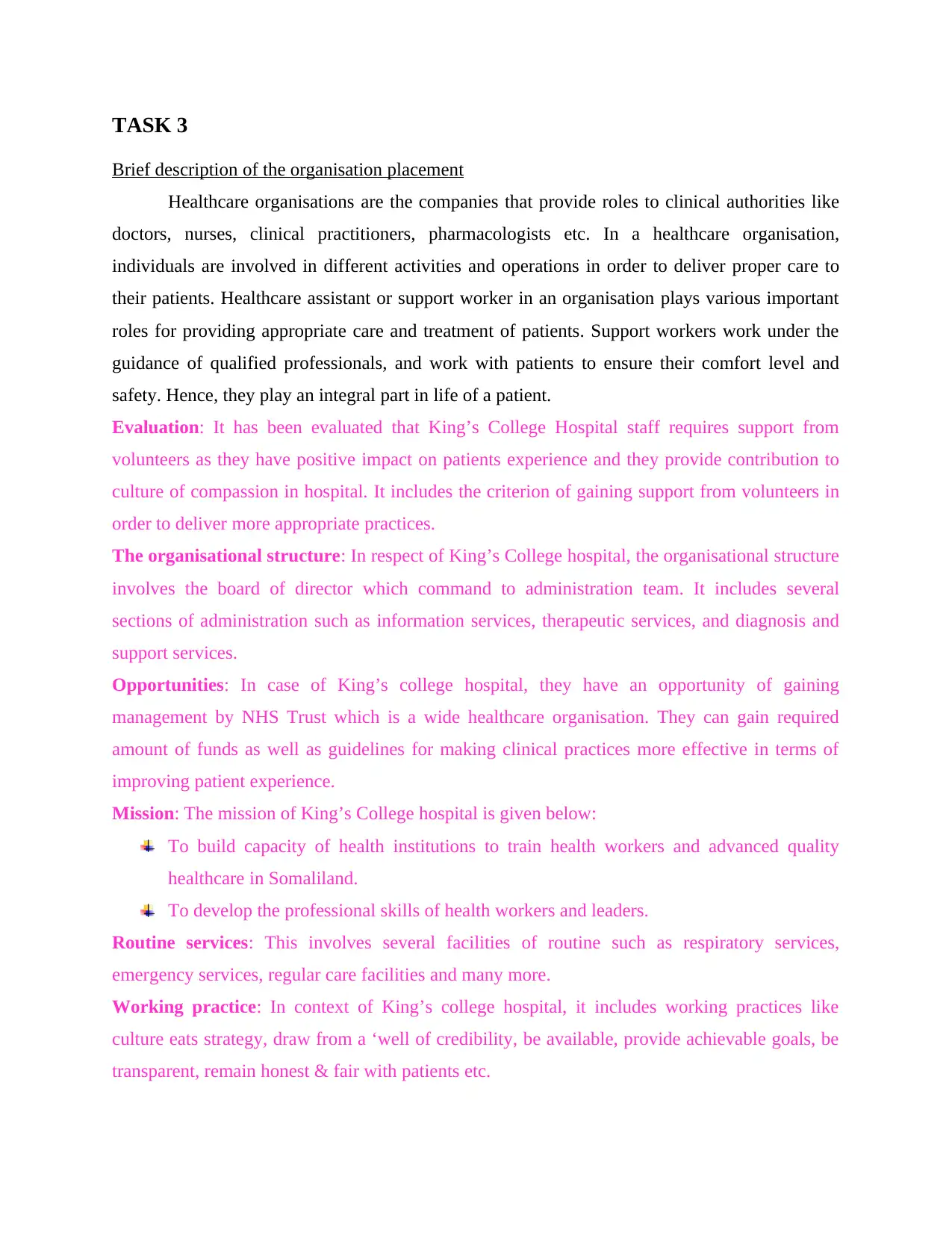
TASK 3
Brief description of the organisation placement
Healthcare organisations are the companies that provide roles to clinical authorities like
doctors, nurses, clinical practitioners, pharmacologists etc. In a healthcare organisation,
individuals are involved in different activities and operations in order to deliver proper care to
their patients. Healthcare assistant or support worker in an organisation plays various important
roles for providing appropriate care and treatment of patients. Support workers work under the
guidance of qualified professionals, and work with patients to ensure their comfort level and
safety. Hence, they play an integral part in life of a patient.
Evaluation: It has been evaluated that King’s College Hospital staff requires support from
volunteers as they have positive impact on patients experience and they provide contribution to
culture of compassion in hospital. It includes the criterion of gaining support from volunteers in
order to deliver more appropriate practices.
The organisational structure: In respect of King’s College hospital, the organisational structure
involves the board of director which command to administration team. It includes several
sections of administration such as information services, therapeutic services, and diagnosis and
support services.
Opportunities: In case of King’s college hospital, they have an opportunity of gaining
management by NHS Trust which is a wide healthcare organisation. They can gain required
amount of funds as well as guidelines for making clinical practices more effective in terms of
improving patient experience.
Mission: The mission of King’s College hospital is given below:
To build capacity of health institutions to train health workers and advanced quality
healthcare in Somaliland.
To develop the professional skills of health workers and leaders.
Routine services: This involves several facilities of routine such as respiratory services,
emergency services, regular care facilities and many more.
Working practice: In context of King’s college hospital, it includes working practices like
culture eats strategy, draw from a ‘well of credibility, be available, provide achievable goals, be
transparent, remain honest & fair with patients etc.
Brief description of the organisation placement
Healthcare organisations are the companies that provide roles to clinical authorities like
doctors, nurses, clinical practitioners, pharmacologists etc. In a healthcare organisation,
individuals are involved in different activities and operations in order to deliver proper care to
their patients. Healthcare assistant or support worker in an organisation plays various important
roles for providing appropriate care and treatment of patients. Support workers work under the
guidance of qualified professionals, and work with patients to ensure their comfort level and
safety. Hence, they play an integral part in life of a patient.
Evaluation: It has been evaluated that King’s College Hospital staff requires support from
volunteers as they have positive impact on patients experience and they provide contribution to
culture of compassion in hospital. It includes the criterion of gaining support from volunteers in
order to deliver more appropriate practices.
The organisational structure: In respect of King’s College hospital, the organisational structure
involves the board of director which command to administration team. It includes several
sections of administration such as information services, therapeutic services, and diagnosis and
support services.
Opportunities: In case of King’s college hospital, they have an opportunity of gaining
management by NHS Trust which is a wide healthcare organisation. They can gain required
amount of funds as well as guidelines for making clinical practices more effective in terms of
improving patient experience.
Mission: The mission of King’s College hospital is given below:
To build capacity of health institutions to train health workers and advanced quality
healthcare in Somaliland.
To develop the professional skills of health workers and leaders.
Routine services: This involves several facilities of routine such as respiratory services,
emergency services, regular care facilities and many more.
Working practice: In context of King’s college hospital, it includes working practices like
culture eats strategy, draw from a ‘well of credibility, be available, provide achievable goals, be
transparent, remain honest & fair with patients etc.
⊘ This is a preview!⊘
Do you want full access?
Subscribe today to unlock all pages.

Trusted by 1+ million students worldwide
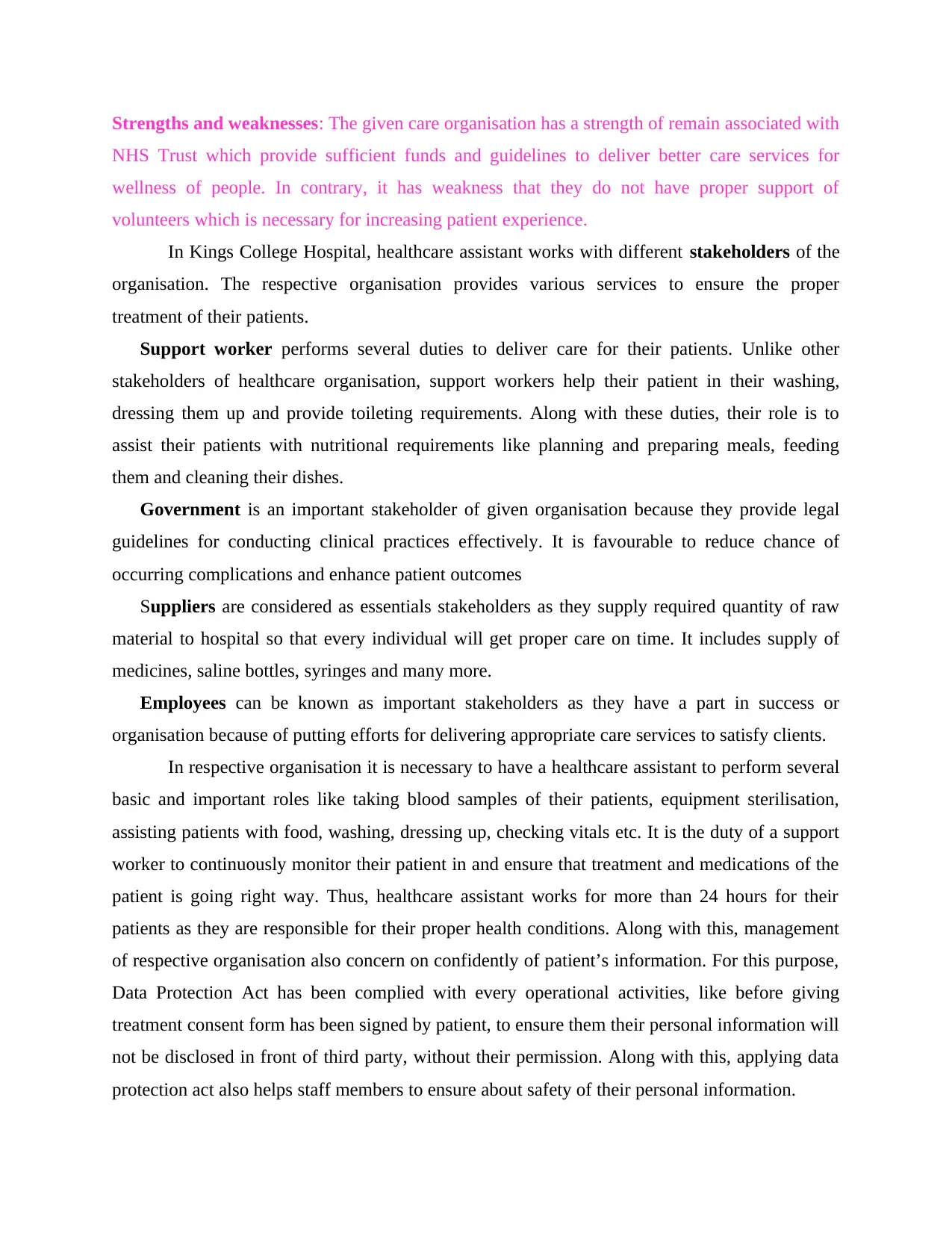
Strengths and weaknesses: The given care organisation has a strength of remain associated with
NHS Trust which provide sufficient funds and guidelines to deliver better care services for
wellness of people. In contrary, it has weakness that they do not have proper support of
volunteers which is necessary for increasing patient experience.
In Kings College Hospital, healthcare assistant works with different stakeholders of the
organisation. The respective organisation provides various services to ensure the proper
treatment of their patients.
Support worker performs several duties to deliver care for their patients. Unlike other
stakeholders of healthcare organisation, support workers help their patient in their washing,
dressing them up and provide toileting requirements. Along with these duties, their role is to
assist their patients with nutritional requirements like planning and preparing meals, feeding
them and cleaning their dishes.
Government is an important stakeholder of given organisation because they provide legal
guidelines for conducting clinical practices effectively. It is favourable to reduce chance of
occurring complications and enhance patient outcomes
Suppliers are considered as essentials stakeholders as they supply required quantity of raw
material to hospital so that every individual will get proper care on time. It includes supply of
medicines, saline bottles, syringes and many more.
Employees can be known as important stakeholders as they have a part in success or
organisation because of putting efforts for delivering appropriate care services to satisfy clients.
In respective organisation it is necessary to have a healthcare assistant to perform several
basic and important roles like taking blood samples of their patients, equipment sterilisation,
assisting patients with food, washing, dressing up, checking vitals etc. It is the duty of a support
worker to continuously monitor their patient in and ensure that treatment and medications of the
patient is going right way. Thus, healthcare assistant works for more than 24 hours for their
patients as they are responsible for their proper health conditions. Along with this, management
of respective organisation also concern on confidently of patient’s information. For this purpose,
Data Protection Act has been complied with every operational activities, like before giving
treatment consent form has been signed by patient, to ensure them their personal information will
not be disclosed in front of third party, without their permission. Along with this, applying data
protection act also helps staff members to ensure about safety of their personal information.
NHS Trust which provide sufficient funds and guidelines to deliver better care services for
wellness of people. In contrary, it has weakness that they do not have proper support of
volunteers which is necessary for increasing patient experience.
In Kings College Hospital, healthcare assistant works with different stakeholders of the
organisation. The respective organisation provides various services to ensure the proper
treatment of their patients.
Support worker performs several duties to deliver care for their patients. Unlike other
stakeholders of healthcare organisation, support workers help their patient in their washing,
dressing them up and provide toileting requirements. Along with these duties, their role is to
assist their patients with nutritional requirements like planning and preparing meals, feeding
them and cleaning their dishes.
Government is an important stakeholder of given organisation because they provide legal
guidelines for conducting clinical practices effectively. It is favourable to reduce chance of
occurring complications and enhance patient outcomes
Suppliers are considered as essentials stakeholders as they supply required quantity of raw
material to hospital so that every individual will get proper care on time. It includes supply of
medicines, saline bottles, syringes and many more.
Employees can be known as important stakeholders as they have a part in success or
organisation because of putting efforts for delivering appropriate care services to satisfy clients.
In respective organisation it is necessary to have a healthcare assistant to perform several
basic and important roles like taking blood samples of their patients, equipment sterilisation,
assisting patients with food, washing, dressing up, checking vitals etc. It is the duty of a support
worker to continuously monitor their patient in and ensure that treatment and medications of the
patient is going right way. Thus, healthcare assistant works for more than 24 hours for their
patients as they are responsible for their proper health conditions. Along with this, management
of respective organisation also concern on confidently of patient’s information. For this purpose,
Data Protection Act has been complied with every operational activities, like before giving
treatment consent form has been signed by patient, to ensure them their personal information will
not be disclosed in front of third party, without their permission. Along with this, applying data
protection act also helps staff members to ensure about safety of their personal information.
Paraphrase This Document
Need a fresh take? Get an instant paraphrase of this document with our AI Paraphraser
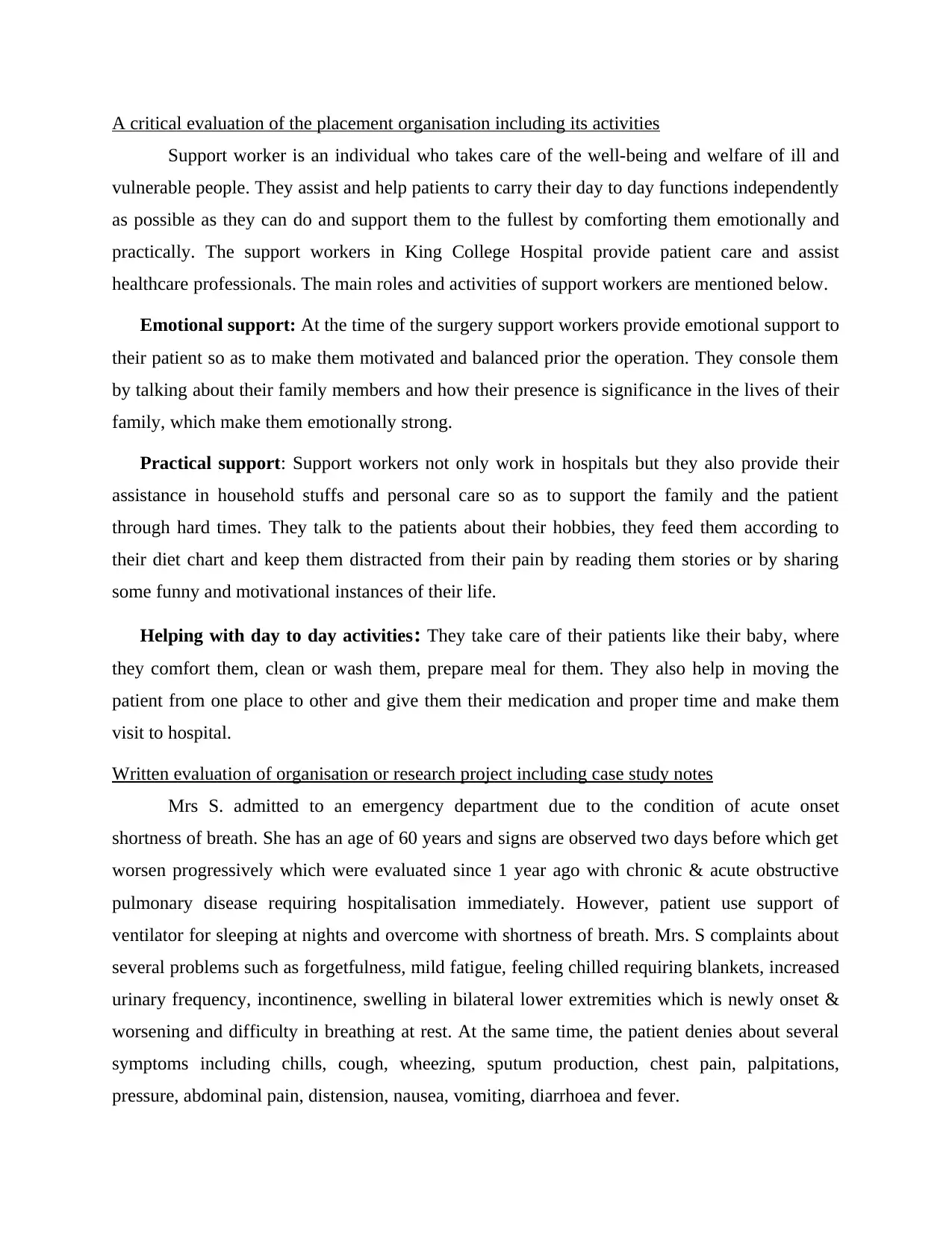
A critical evaluation of the placement organisation including its activities
Support worker is an individual who takes care of the well-being and welfare of ill and
vulnerable people. They assist and help patients to carry their day to day functions independently
as possible as they can do and support them to the fullest by comforting them emotionally and
practically. The support workers in King College Hospital provide patient care and assist
healthcare professionals. The main roles and activities of support workers are mentioned below.
Emotional support: At the time of the surgery support workers provide emotional support to
their patient so as to make them motivated and balanced prior the operation. They console them
by talking about their family members and how their presence is significance in the lives of their
family, which make them emotionally strong.
Practical support: Support workers not only work in hospitals but they also provide their
assistance in household stuffs and personal care so as to support the family and the patient
through hard times. They talk to the patients about their hobbies, they feed them according to
their diet chart and keep them distracted from their pain by reading them stories or by sharing
some funny and motivational instances of their life.
Helping with day to day activities: They take care of their patients like their baby, where
they comfort them, clean or wash them, prepare meal for them. They also help in moving the
patient from one place to other and give them their medication and proper time and make them
visit to hospital.
Written evaluation of organisation or research project including case study notes
Mrs S. admitted to an emergency department due to the condition of acute onset
shortness of breath. She has an age of 60 years and signs are observed two days before which get
worsen progressively which were evaluated since 1 year ago with chronic & acute obstructive
pulmonary disease requiring hospitalisation immediately. However, patient use support of
ventilator for sleeping at nights and overcome with shortness of breath. Mrs. S complaints about
several problems such as forgetfulness, mild fatigue, feeling chilled requiring blankets, increased
urinary frequency, incontinence, swelling in bilateral lower extremities which is newly onset &
worsening and difficulty in breathing at rest. At the same time, the patient denies about several
symptoms including chills, cough, wheezing, sputum production, chest pain, palpitations,
pressure, abdominal pain, distension, nausea, vomiting, diarrhoea and fever.
Support worker is an individual who takes care of the well-being and welfare of ill and
vulnerable people. They assist and help patients to carry their day to day functions independently
as possible as they can do and support them to the fullest by comforting them emotionally and
practically. The support workers in King College Hospital provide patient care and assist
healthcare professionals. The main roles and activities of support workers are mentioned below.
Emotional support: At the time of the surgery support workers provide emotional support to
their patient so as to make them motivated and balanced prior the operation. They console them
by talking about their family members and how their presence is significance in the lives of their
family, which make them emotionally strong.
Practical support: Support workers not only work in hospitals but they also provide their
assistance in household stuffs and personal care so as to support the family and the patient
through hard times. They talk to the patients about their hobbies, they feed them according to
their diet chart and keep them distracted from their pain by reading them stories or by sharing
some funny and motivational instances of their life.
Helping with day to day activities: They take care of their patients like their baby, where
they comfort them, clean or wash them, prepare meal for them. They also help in moving the
patient from one place to other and give them their medication and proper time and make them
visit to hospital.
Written evaluation of organisation or research project including case study notes
Mrs S. admitted to an emergency department due to the condition of acute onset
shortness of breath. She has an age of 60 years and signs are observed two days before which get
worsen progressively which were evaluated since 1 year ago with chronic & acute obstructive
pulmonary disease requiring hospitalisation immediately. However, patient use support of
ventilator for sleeping at nights and overcome with shortness of breath. Mrs. S complaints about
several problems such as forgetfulness, mild fatigue, feeling chilled requiring blankets, increased
urinary frequency, incontinence, swelling in bilateral lower extremities which is newly onset &
worsening and difficulty in breathing at rest. At the same time, the patient denies about several
symptoms including chills, cough, wheezing, sputum production, chest pain, palpitations,
pressure, abdominal pain, distension, nausea, vomiting, diarrhoea and fever.
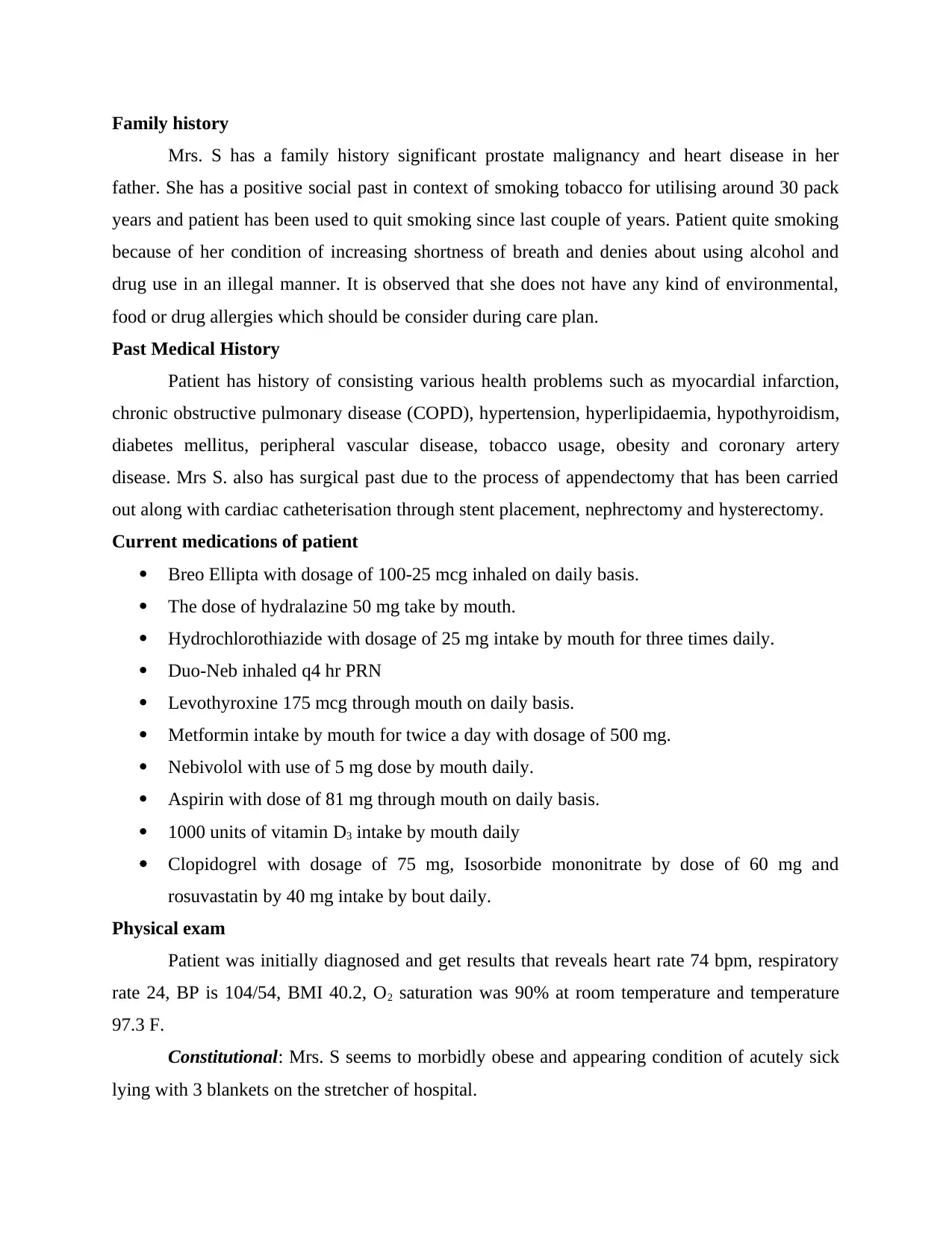
Family history
Mrs. S has a family history significant prostate malignancy and heart disease in her
father. She has a positive social past in context of smoking tobacco for utilising around 30 pack
years and patient has been used to quit smoking since last couple of years. Patient quite smoking
because of her condition of increasing shortness of breath and denies about using alcohol and
drug use in an illegal manner. It is observed that she does not have any kind of environmental,
food or drug allergies which should be consider during care plan.
Past Medical History
Patient has history of consisting various health problems such as myocardial infarction,
chronic obstructive pulmonary disease (COPD), hypertension, hyperlipidaemia, hypothyroidism,
diabetes mellitus, peripheral vascular disease, tobacco usage, obesity and coronary artery
disease. Mrs S. also has surgical past due to the process of appendectomy that has been carried
out along with cardiac catheterisation through stent placement, nephrectomy and hysterectomy.
Current medications of patient
Breo Ellipta with dosage of 100-25 mcg inhaled on daily basis.
The dose of hydralazine 50 mg take by mouth.
Hydrochlorothiazide with dosage of 25 mg intake by mouth for three times daily.
Duo-Neb inhaled q4 hr PRN
Levothyroxine 175 mcg through mouth on daily basis.
Metformin intake by mouth for twice a day with dosage of 500 mg.
Nebivolol with use of 5 mg dose by mouth daily.
Aspirin with dose of 81 mg through mouth on daily basis.
1000 units of vitamin D3 intake by mouth daily
Clopidogrel with dosage of 75 mg, Isosorbide mononitrate by dose of 60 mg and
rosuvastatin by 40 mg intake by bout daily.
Physical exam
Patient was initially diagnosed and get results that reveals heart rate 74 bpm, respiratory
rate 24, BP is 104/54, BMI 40.2, O2 saturation was 90% at room temperature and temperature
97.3 F.
Constitutional: Mrs. S seems to morbidly obese and appearing condition of acutely sick
lying with 3 blankets on the stretcher of hospital.
Mrs. S has a family history significant prostate malignancy and heart disease in her
father. She has a positive social past in context of smoking tobacco for utilising around 30 pack
years and patient has been used to quit smoking since last couple of years. Patient quite smoking
because of her condition of increasing shortness of breath and denies about using alcohol and
drug use in an illegal manner. It is observed that she does not have any kind of environmental,
food or drug allergies which should be consider during care plan.
Past Medical History
Patient has history of consisting various health problems such as myocardial infarction,
chronic obstructive pulmonary disease (COPD), hypertension, hyperlipidaemia, hypothyroidism,
diabetes mellitus, peripheral vascular disease, tobacco usage, obesity and coronary artery
disease. Mrs S. also has surgical past due to the process of appendectomy that has been carried
out along with cardiac catheterisation through stent placement, nephrectomy and hysterectomy.
Current medications of patient
Breo Ellipta with dosage of 100-25 mcg inhaled on daily basis.
The dose of hydralazine 50 mg take by mouth.
Hydrochlorothiazide with dosage of 25 mg intake by mouth for three times daily.
Duo-Neb inhaled q4 hr PRN
Levothyroxine 175 mcg through mouth on daily basis.
Metformin intake by mouth for twice a day with dosage of 500 mg.
Nebivolol with use of 5 mg dose by mouth daily.
Aspirin with dose of 81 mg through mouth on daily basis.
1000 units of vitamin D3 intake by mouth daily
Clopidogrel with dosage of 75 mg, Isosorbide mononitrate by dose of 60 mg and
rosuvastatin by 40 mg intake by bout daily.
Physical exam
Patient was initially diagnosed and get results that reveals heart rate 74 bpm, respiratory
rate 24, BP is 104/54, BMI 40.2, O2 saturation was 90% at room temperature and temperature
97.3 F.
Constitutional: Mrs. S seems to morbidly obese and appearing condition of acutely sick
lying with 3 blankets on the stretcher of hospital.
⊘ This is a preview!⊘
Do you want full access?
Subscribe today to unlock all pages.

Trusted by 1+ million students worldwide
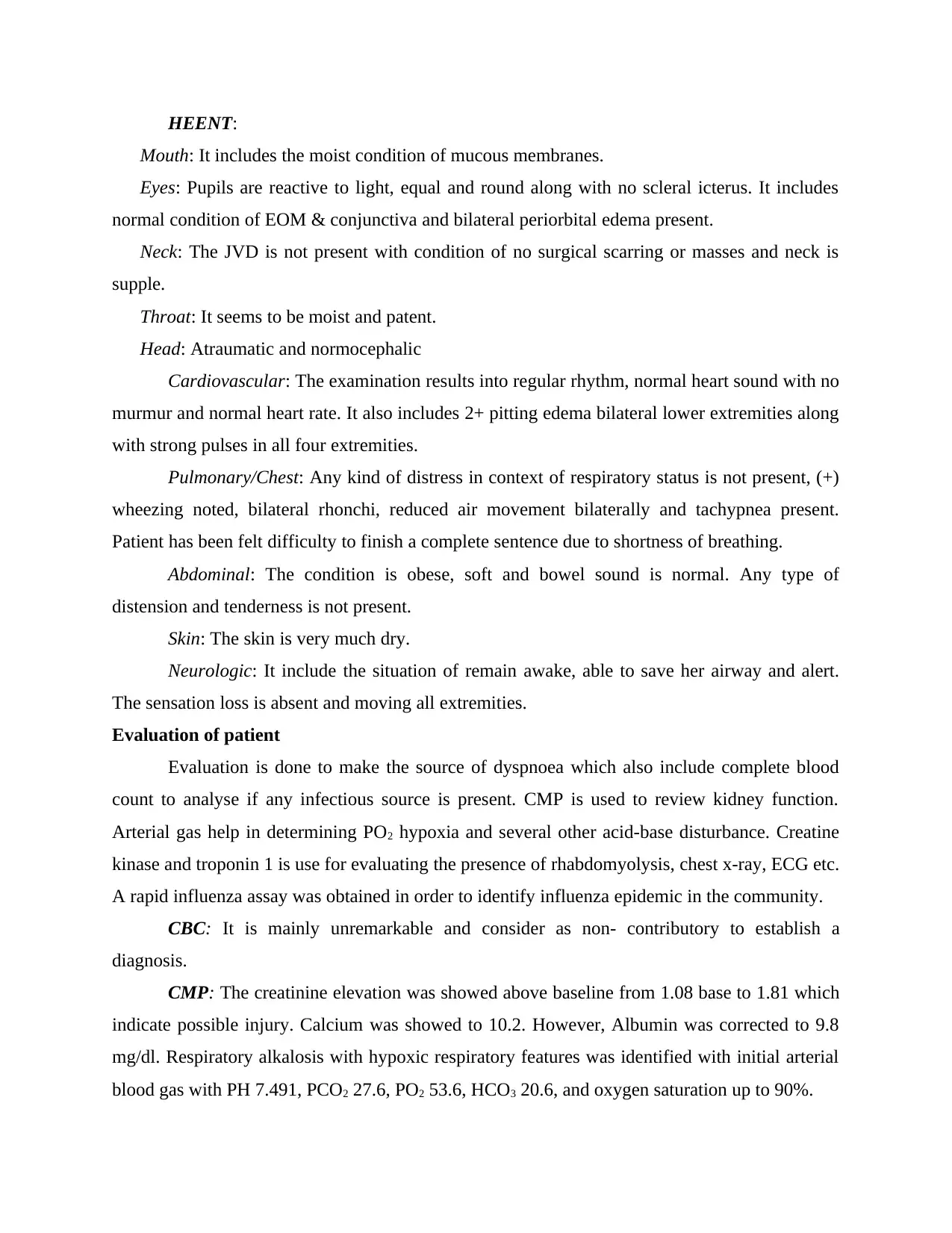
HEENT:
Mouth: It includes the moist condition of mucous membranes.
Eyes: Pupils are reactive to light, equal and round along with no scleral icterus. It includes
normal condition of EOM & conjunctiva and bilateral periorbital edema present.
Neck: The JVD is not present with condition of no surgical scarring or masses and neck is
supple.
Throat: It seems to be moist and patent.
Head: Atraumatic and normocephalic
Cardiovascular: The examination results into regular rhythm, normal heart sound with no
murmur and normal heart rate. It also includes 2+ pitting edema bilateral lower extremities along
with strong pulses in all four extremities.
Pulmonary/Chest: Any kind of distress in context of respiratory status is not present, (+)
wheezing noted, bilateral rhonchi, reduced air movement bilaterally and tachypnea present.
Patient has been felt difficulty to finish a complete sentence due to shortness of breathing.
Abdominal: The condition is obese, soft and bowel sound is normal. Any type of
distension and tenderness is not present.
Skin: The skin is very much dry.
Neurologic: It include the situation of remain awake, able to save her airway and alert.
The sensation loss is absent and moving all extremities.
Evaluation of patient
Evaluation is done to make the source of dyspnoea which also include complete blood
count to analyse if any infectious source is present. CMP is used to review kidney function.
Arterial gas help in determining PO2 hypoxia and several other acid-base disturbance. Creatine
kinase and troponin 1 is use for evaluating the presence of rhabdomyolysis, chest x-ray, ECG etc.
A rapid influenza assay was obtained in order to identify influenza epidemic in the community.
CBC: It is mainly unremarkable and consider as non- contributory to establish a
diagnosis.
CMP: The creatinine elevation was showed above baseline from 1.08 base to 1.81 which
indicate possible injury. Calcium was showed to 10.2. However, Albumin was corrected to 9.8
mg/dl. Respiratory alkalosis with hypoxic respiratory features was identified with initial arterial
blood gas with PH 7.491, PCO2 27.6, PO2 53.6, HCO3 20.6, and oxygen saturation up to 90%.
Mouth: It includes the moist condition of mucous membranes.
Eyes: Pupils are reactive to light, equal and round along with no scleral icterus. It includes
normal condition of EOM & conjunctiva and bilateral periorbital edema present.
Neck: The JVD is not present with condition of no surgical scarring or masses and neck is
supple.
Throat: It seems to be moist and patent.
Head: Atraumatic and normocephalic
Cardiovascular: The examination results into regular rhythm, normal heart sound with no
murmur and normal heart rate. It also includes 2+ pitting edema bilateral lower extremities along
with strong pulses in all four extremities.
Pulmonary/Chest: Any kind of distress in context of respiratory status is not present, (+)
wheezing noted, bilateral rhonchi, reduced air movement bilaterally and tachypnea present.
Patient has been felt difficulty to finish a complete sentence due to shortness of breathing.
Abdominal: The condition is obese, soft and bowel sound is normal. Any type of
distension and tenderness is not present.
Skin: The skin is very much dry.
Neurologic: It include the situation of remain awake, able to save her airway and alert.
The sensation loss is absent and moving all extremities.
Evaluation of patient
Evaluation is done to make the source of dyspnoea which also include complete blood
count to analyse if any infectious source is present. CMP is used to review kidney function.
Arterial gas help in determining PO2 hypoxia and several other acid-base disturbance. Creatine
kinase and troponin 1 is use for evaluating the presence of rhabdomyolysis, chest x-ray, ECG etc.
A rapid influenza assay was obtained in order to identify influenza epidemic in the community.
CBC: It is mainly unremarkable and consider as non- contributory to establish a
diagnosis.
CMP: The creatinine elevation was showed above baseline from 1.08 base to 1.81 which
indicate possible injury. Calcium was showed to 10.2. However, Albumin was corrected to 9.8
mg/dl. Respiratory alkalosis with hypoxic respiratory features was identified with initial arterial
blood gas with PH 7.491, PCO2 27.6, PO2 53.6, HCO3 20.6, and oxygen saturation up to 90%.
Paraphrase This Document
Need a fresh take? Get an instant paraphrase of this document with our AI Paraphraser
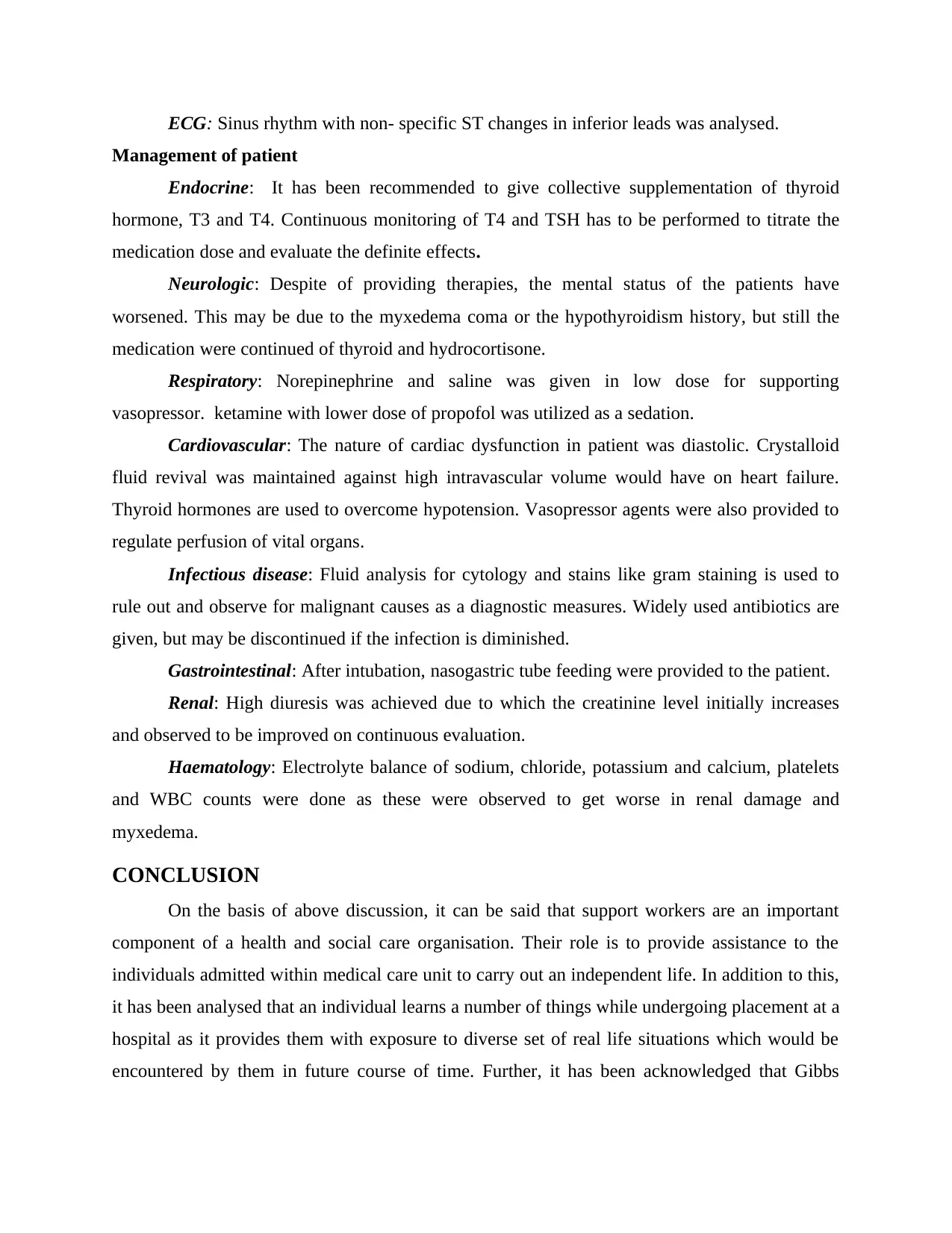
ECG: Sinus rhythm with non- specific ST changes in inferior leads was analysed.
Management of patient
Endocrine: It has been recommended to give collective supplementation of thyroid
hormone, T3 and T4. Continuous monitoring of T4 and TSH has to be performed to titrate the
medication dose and evaluate the definite effects.
Neurologic: Despite of providing therapies, the mental status of the patients have
worsened. This may be due to the myxedema coma or the hypothyroidism history, but still the
medication were continued of thyroid and hydrocortisone.
Respiratory: Norepinephrine and saline was given in low dose for supporting
vasopressor. ketamine with lower dose of propofol was utilized as a sedation.
Cardiovascular: The nature of cardiac dysfunction in patient was diastolic. Crystalloid
fluid revival was maintained against high intravascular volume would have on heart failure.
Thyroid hormones are used to overcome hypotension. Vasopressor agents were also provided to
regulate perfusion of vital organs.
Infectious disease: Fluid analysis for cytology and stains like gram staining is used to
rule out and observe for malignant causes as a diagnostic measures. Widely used antibiotics are
given, but may be discontinued if the infection is diminished.
Gastrointestinal: After intubation, nasogastric tube feeding were provided to the patient.
Renal: High diuresis was achieved due to which the creatinine level initially increases
and observed to be improved on continuous evaluation.
Haematology: Electrolyte balance of sodium, chloride, potassium and calcium, platelets
and WBC counts were done as these were observed to get worse in renal damage and
myxedema.
CONCLUSION
On the basis of above discussion, it can be said that support workers are an important
component of a health and social care organisation. Their role is to provide assistance to the
individuals admitted within medical care unit to carry out an independent life. In addition to this,
it has been analysed that an individual learns a number of things while undergoing placement at a
hospital as it provides them with exposure to diverse set of real life situations which would be
encountered by them in future course of time. Further, it has been acknowledged that Gibbs
Management of patient
Endocrine: It has been recommended to give collective supplementation of thyroid
hormone, T3 and T4. Continuous monitoring of T4 and TSH has to be performed to titrate the
medication dose and evaluate the definite effects.
Neurologic: Despite of providing therapies, the mental status of the patients have
worsened. This may be due to the myxedema coma or the hypothyroidism history, but still the
medication were continued of thyroid and hydrocortisone.
Respiratory: Norepinephrine and saline was given in low dose for supporting
vasopressor. ketamine with lower dose of propofol was utilized as a sedation.
Cardiovascular: The nature of cardiac dysfunction in patient was diastolic. Crystalloid
fluid revival was maintained against high intravascular volume would have on heart failure.
Thyroid hormones are used to overcome hypotension. Vasopressor agents were also provided to
regulate perfusion of vital organs.
Infectious disease: Fluid analysis for cytology and stains like gram staining is used to
rule out and observe for malignant causes as a diagnostic measures. Widely used antibiotics are
given, but may be discontinued if the infection is diminished.
Gastrointestinal: After intubation, nasogastric tube feeding were provided to the patient.
Renal: High diuresis was achieved due to which the creatinine level initially increases
and observed to be improved on continuous evaluation.
Haematology: Electrolyte balance of sodium, chloride, potassium and calcium, platelets
and WBC counts were done as these were observed to get worse in renal damage and
myxedema.
CONCLUSION
On the basis of above discussion, it can be said that support workers are an important
component of a health and social care organisation. Their role is to provide assistance to the
individuals admitted within medical care unit to carry out an independent life. In addition to this,
it has been analysed that an individual learns a number of things while undergoing placement at a
hospital as it provides them with exposure to diverse set of real life situations which would be
encountered by them in future course of time. Further, it has been acknowledged that Gibbs
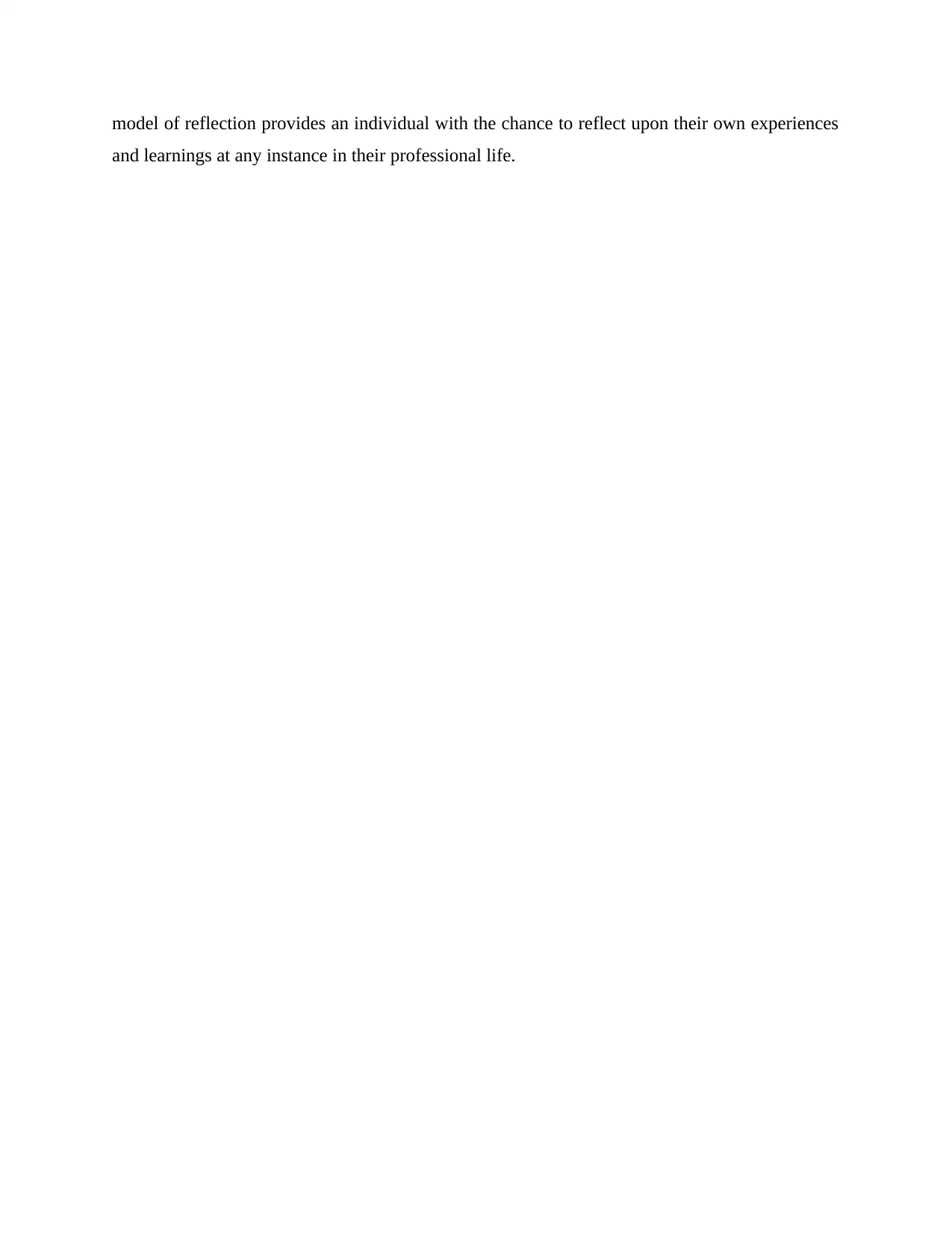
model of reflection provides an individual with the chance to reflect upon their own experiences
and learnings at any instance in their professional life.
and learnings at any instance in their professional life.
⊘ This is a preview!⊘
Do you want full access?
Subscribe today to unlock all pages.

Trusted by 1+ million students worldwide
1 out of 13
Related Documents
Your All-in-One AI-Powered Toolkit for Academic Success.
+13062052269
info@desklib.com
Available 24*7 on WhatsApp / Email
![[object Object]](/_next/static/media/star-bottom.7253800d.svg)
Unlock your academic potential
Copyright © 2020–2025 A2Z Services. All Rights Reserved. Developed and managed by ZUCOL.



